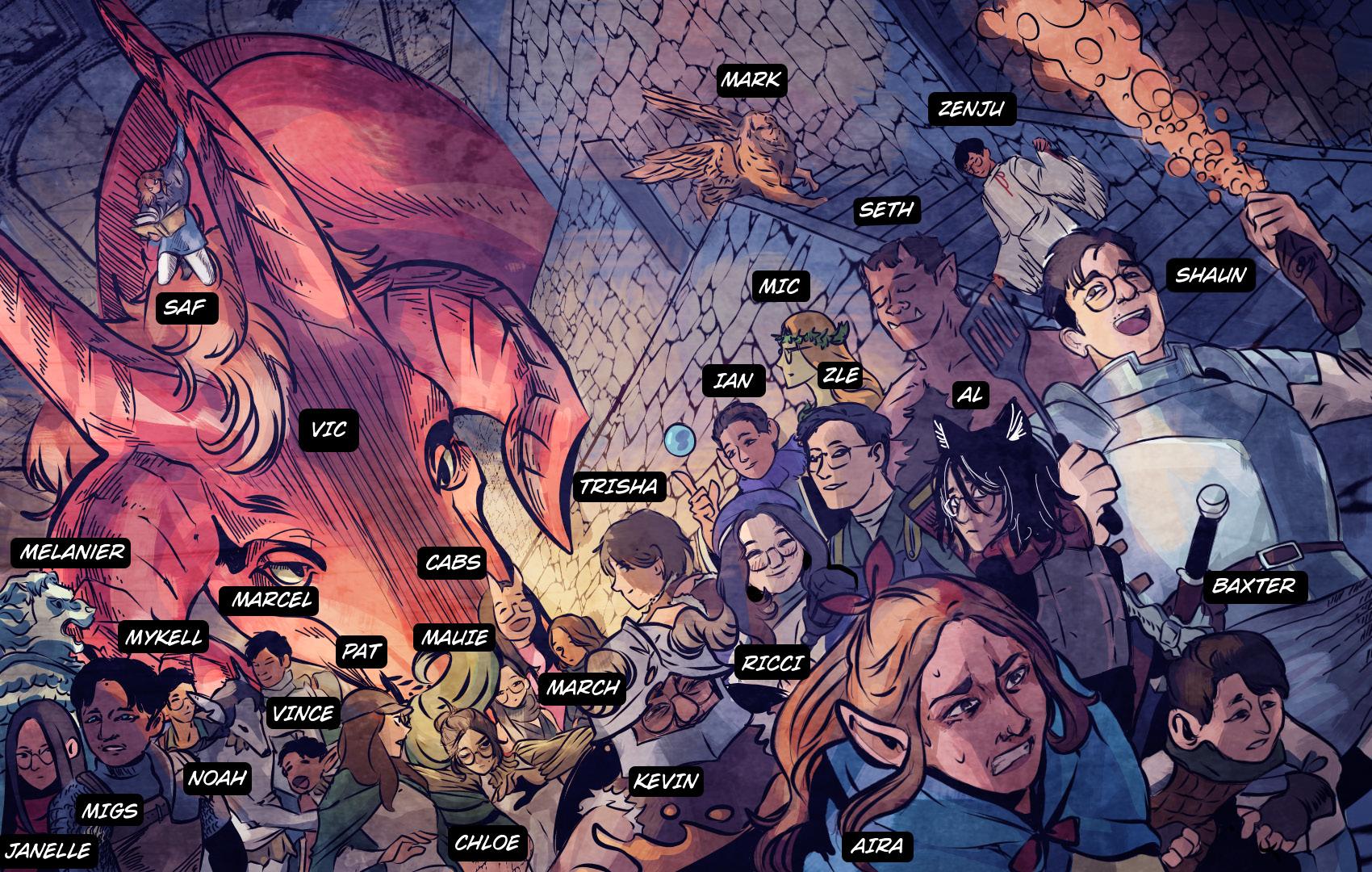




DASIG reign continues, Cotacte-Sudaria tandem

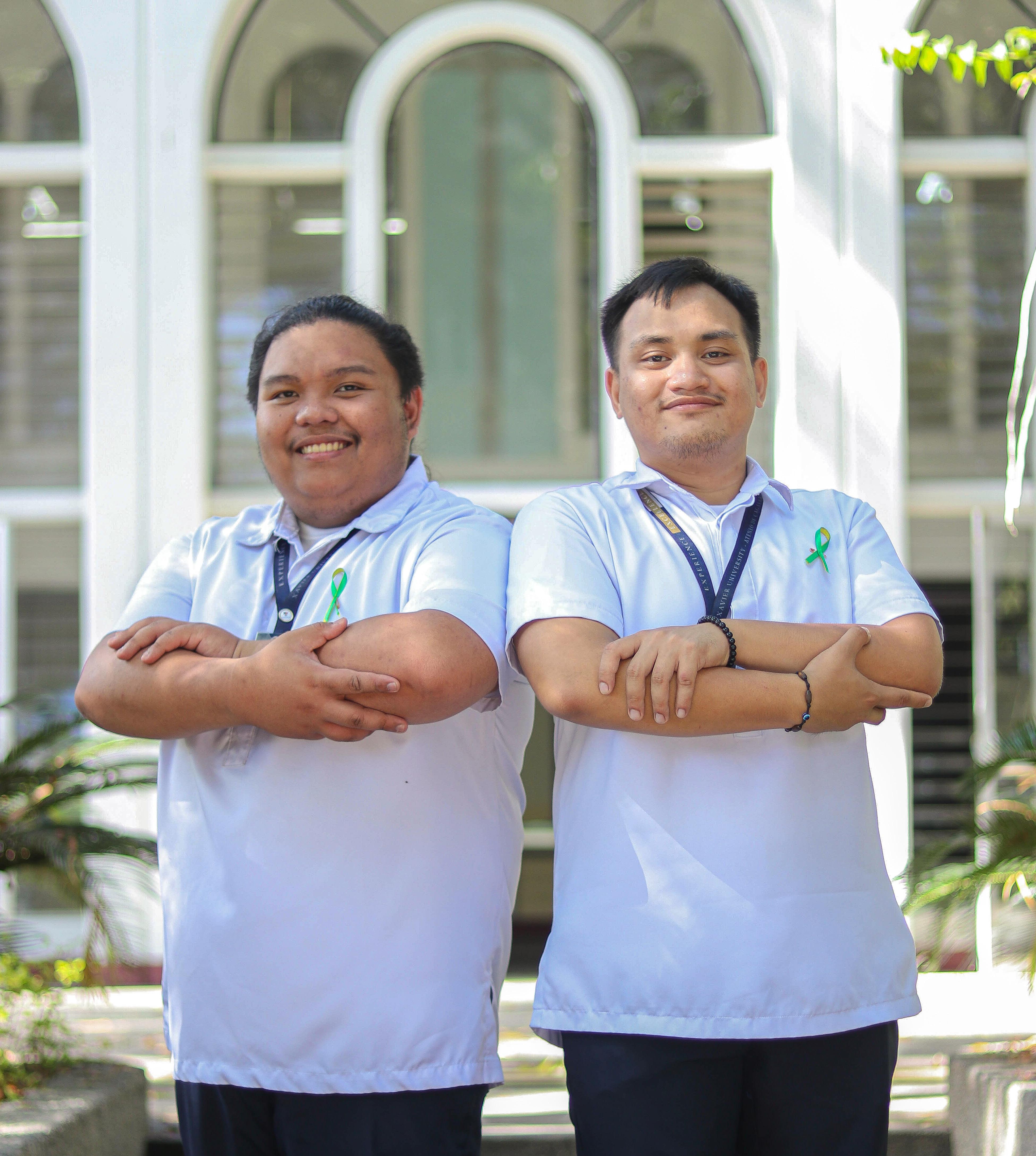
By Vic Danielle T. Magas
n April 22, Botar Atenista 2024 concluded with Kyle Chester J. Cotacte (AB Econ 3) and Janson Jaynice M. Sudaria (ABIS 3) of the Asusasyon sa mga Nagkahiusang Estudyante para sa Progresibo ug Madasigonon na Ateneo (DASIG) emerging as the XU Central Student Government (CSG) president and vice president for AY 2024-2025.
As declared by the CSG Electoral Commission (CSG-ELECOM), Cotacte and Sudaria emerged victorius over Korrine Glora Abalde (BSEE 4) and Vince Agustine A. Labiano (BSED 3), standard bearers from the University’s long-established political party, Alyansang Atenista (AA), with 2,300 (64.50%)
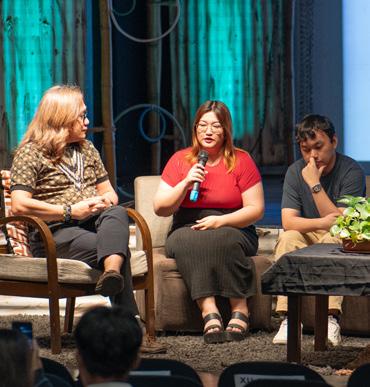
and 2016 (56.53%) votes, respectively. The Abalde-Labiano tandem fell behind with 793 (22.24%) and 1,087 (30.48%) votes.
And while the XU student body continued to put its trust in the green and yellow, the reds and blues put up a fight of their own too.
Repeated election drama
Three parties have officially registered with the CSG-ELECOM for this electoral race, including the Union of Students for the Advancement of Democracy (USAD), but only two were geared to occupy the CSG high offices. An all too familiar scene in the competitive election atmosphere in the University, AA continued to challenge the two-
year streak made by DASIG, while USAD once again snubbed the CSG slate, putting them “out of place” in the election scene.
We have seen this before; today’s political arena was just a rematch from last year. DASIG secured the spotlight, electing banner bearers who have had a consistent presence in the CSG for two consecutive years. Whereas, AA is represented by two student leaders with strong dedication within the shadows of college councils, working diligently at the grassroots level.
By Maria Meliza R. Rocat
s the campus teems with energy at the impending Botar Atenista, the colorful wave of student holism brings a day of respite from the hubbub, with the Assembly of Extra-Curricular Organizations (AECO) launching the Org Fair 2024: tudloAECO Orgmania on April 6 at the University grounds. Joined by 13 extra-curricular organizations, the event culminated the AECO Week that commenced on April 3. tudloAECO Orgmania aimed to give back to the community through engagement in different fields, from health and wellness, recreation, and culture and the arts.



By Noelle Anne J. Yap
The top governing spot demands the strongest leader in its stead, and a woman challenges the tides of a male-dominated candidacy. Korrine Glora Abalde (BSEE 3) seeks forth blue skies at the top of the XU Central Student Government’s (CSG) presidential slate as Alyansang Atenista’s (AA’s) frontwoman, bringing along her run at the college council level under her belt.
Looking back at her life as a student leader, Abalde has served the student body for 3 consecutive years as part of the Association of the College of Engineering Students (ACES). Along the way, her will to serve the University community grew profoundly from normal studentry to becoming a part of the bigger governing body. Later on, Abalde warmly welcomed her position as CSG’s Senator of Academic Affairs, further proving her capacity to lead.
A policy she champions is ‘SPW’, which stands for Separate Personal Matters from Work Matters. She explains that the key to serving the student community more effectively would be to properly balance and organize personal, academic, or political affairs accordingly and responsibly. “I envision CSG with this policy—taking criticism accordingly and solving conflicts expertly,” Abalde cites, strengthening the foundations of student leadership through the will and skill of the leaders themselves.
As the current administration comes to a close, she strives for excellence at
the forefront of a new one, becoming the bearer of AA’s prestigious potential. With a burning passion for governance that spans 37 years, the alliance continues its efforts to live up to its name. In sync with the party’s fortitude and strength, Abalde shares: “The ALAB Movement envisions a Xavier Ateneo that is collective, formative in nature, accessible to all, and engaged in nation-building. It encapsulates our immense enthusiasm for service by HUE, and with YOU.” With her running mates’ support, AA believes that it “simply gets better from here.”
Though one might believe that the view from the top is unnerving, Abalde’s candidacy emerges unfazed. Guided by the light of hope for her student constituents, her start at the grassroots level of administration provides her with an edge in the race for the presidency. “Being an athlete and a student assistant humbled me to understand the side of our constituents, and use these to improve the governance we envision,” she shares.
The next administration under Abalde’s governance should expect a platform that strongly underscores student services and sectoral representation, leading with close regard to the University community. Prepare for undying potential as holistic relationships between student leaders and their constituents bridge gaps between students, athletes, and leaders’ needs.
A feminine figurehead prepares to take center stage, watch as she owns her potential.C
By Jomar G. Manabilang
n response to the fissures created in society, Vince Agustine A. Labiano (BSEd Math 3) refuses to let people feel disenfranchised.
Running for the second-highest seat in the XU Central Student Government (CSG) under the banner of Alyansang Atenista (AA), Labiano believes that each individual deserves equal opportunities for growth and advancement.
Labiano’s commitment to service was evident when he became a volunteer in his community as a facilitator of the Red Cross Youth of the city. Motivated by this profound dedication, he sought to extend his service to the University. Last year, he was elected as the President of the Teacher’s Guild (TG) for this current term.
Yet, some ask why this candidate is running for CSG Vice President when his current affiliations do not primarily involve legislative duties. While on the surface, his executive roles in TG and ten-month tenure with the Association of Xavier University Oro Scholars (AXUOS) may not seem extensive, Labiano’s term as TG Vice President during the previous year (AY 2022–2023) equipped him with the skills necessary for the seat he aspires to occupy. As a member of the 1st Senate, he gained a deep appreciation for the significance of legislation.
With a vision of a community that is collective, formative, accessible, and engaged in nation-building, Labiano, alongside his tandem, Korinne Abalde (BSEE 4), presents the Abalde-Labiano
(ALAB) Movement—integrated from the principles of being open, inclusive, and empowered, and true to a love for service.
One platform under this movement is “Celebrating HUE (Celebrating You),” which promotes diversity and individuality. With the unique differences of the XU community, they pledge to create an inclusive environment for the student body where students can freely express themselves without fear of judgment. It encompasses the following projects: One Big Pride, Student Assistant Assembly, Cultural Night, Big Blue Day, and Athletes Night.
Adjoining their platforms are “Prayer Space” and “Lending Hue: Amplified Student Services across Sectors.” The former aims to provide Muslim students with more accessible prayer spaces, secluded from disturbances. The latter focuses on enhancing collective student services, portioned into three aspects: physical resources, financial resources, and formation services, with a selection criteria established through screening to ensure fair distribution.
Lastly, stirring from his firsthand experience in community service, Labiano is eager to introduce “CommHUEniTeach.” It aims to streamline community engagement activities for organizations through a systematic approach, ensuring each participates in at least one community-involved activity annually.
Beyond his desire to create opportunities, Labiano is ready to champion the voices of the students.C


Read the full online version of this issue at bit.ly/AprilBroadsheet24 or at issuu.com/thecrusaderpub

DASIG | CSG President
By Henniequel Shayne Acobo
For Kyle Chester Cotacte (AB Econ 3), student leadership is rooted in his blood. Having an extensive background in legislation, his decision to run as the next XU Central Student Government (CSG) President, under the banner of DASIG was a long time coming. More so, it felt like the next right thing for him to do.
At the beginning of his student leadership journey, Cotacte took the chance to stand up for the Students’ Rights and Welfare (STRAW) Ordinance through CSG. He was also part of those behind the Schola Brevis, and Unyon Mindanao; as even at the city level, he lobbied the Oro STRAW Ordinance to the Oro Youth Development Council. To further show his passion for legislation, he continued to extend his service to the city as one of the City Youth Counselors for over seven years now. What started as lobbying for one advocacy turned into the creation of the party he now represents—Asusasyon sa mga Nagkahiusang Estudyante para sa Progresibo ug Madasigonon na Ateneo (DASIG). Together with other student leaders, they formed DASIG intending to provide progressive governance and student representation. For Cotacte, it did not matter then if he was in the sidelines, knowing that he could contribute to the mission of his party at the grassroots level.
Now as he sets his eyes on the role of CSG President, Cotacte shifts from the sidelines to the center stage, expressing his confidence and intent to get things done.
“Drawn from my experience of leading certain causes of CSG, one can really say that there is so much more that we can do onto the next,” he affirms.
Among his envisioned changes for the next academic year is the continued involvement of their GREEN agenda: Governance for all; Re-igniting leadership that does justice; Expanding and sustaining student aid and assistance; Enhancing the culture of sectoral representation; and Networks and Advocacy. With these, he seeks to usher in a new era of student leadership while fostering a culture that appreciates the diversity of the student body. In addition, he believes that addressing the sustainability and expansion of CSG’s existing services shall be prioritized.
In this Botar Atenista election, Cotacte hopes for one thing: that student leaders not only convey their platforms during the campaign season but, more importantly, manifest these ideals beforehand and implement the subsequent initiatives once they are elected.
Looking onward and focusing upward, he shares one last message to the student body,:“Xavier Ateneo cries for us [studentleaders], let us shape [sic] better moments for each of our Ka-CSG, onto the next.”C
By LJ Dawn A. Dapanas
n the belief that the fundamental role of being a student leader transcends beyond events management, Janson Jaynice Sudaria (ABIS 3) shares that carving out and elevating spaces that empower the student body is the heart of student leadership.
As a champion of legislation that caters to the needs of constituents, Sudaria has an array of experiences that ready him for the role XU Central Student Government (CSG) Vice President. He currently holds the position of Mindanao Convener for Students’ Rights and Welfare Coalition of the Philippines; he is also the chairperson of the Committee on Appointments of the 2nd Senate of CSG OVP.
In his freshman year, Sudaria joined the technical team that drafted the General Appropriations Act of 2021 and the Directorate Rules and Procedures Act of 2021. While in his sophomore year, he authored the XU–CSG Students’ Rights and Welfare Act of 2023 and the resolution requesting the Office of Student Affairs (OSA) to issue clear and gender-inclusive guidelines for the 2023 Crusader Yearbook Pictorials.
As the incumbent Vice President and Council House of Senate Convener of the United Arts and Sciences Student Council, he filed 17 bills, seven of which transpired into law: Sudaria also passed 36 resolutions under his leadership. At the University level, he acts as the Senator for Political Affairs of the 2nd Senate under
the CSG OVP, where he authored 14 bills, nine of which were enacted into law, while 63 resolutions were approved. For Sudaria, running for the Vice Presidential seat would broaden the horizon for student services. Thus, elevating what it means to be a student legislator is what he envisions during his term. He shares that projects that ensure the flourishing of a legislative renaissance will not only be at the CSG level but also reflected in College Student Councils (CSCs)—culminating in their vision of #MagisThroughLegis. “Several specific initiatives under the GREEN Agenda will be implemented under the CSG–Office of the President,” he shares. Citing the revisitation of the XU Magna Carta, streamlining basic student services to CSCs, formation of co-curricular and council charter taskforce, institutionalizing sectoral representation and legislative capacity training in the CSCs, and the continuation of the FOURward Agenda.
“If elected as Vice President, I will make sure that systems and frameworks are streamlined to the legislative branches of each CSCs,” he states, adding that centralizing systems are proven effective and would lessen bureaucracy that causes the bottlenecks in the student government.
With a strong suit in legislation, Sudaria has an edge that prepares him for the responsibilities of a CSG Vice President—one that is a partner to the President and one that facilitates the flow of legislation.C
or at issuu.com/thecrusaderpub



ocial judgment extends beyond formal policies and moral codes. While found in unwritten norms, it is also no stranger in marketplace dynamics and the corporate environment. Boycotts represent a direct manifestation of this—a collective expression that emerges when public values are compromised in favor of corporate benefit, and a unified stance against these perceived malpractices.
Consider the recent display of public support for victims of the ongoing conflict in Gaza, Palestine, where many have turned to boycotts as a potent form of protest against companies allegedly funding Israeli warfare. While highly-developed countries have demonstrated the efficacy of boycotting, the Philippines presents a unique challenge, with the movement met with resistance among consumers. However, the resistance is not unfounded—deeper scrutiny would reveal the underlying issues of purchasing power, consumer preference, and the perpetually dire working conditions of our citizens.
As it stands, the economic reality of the Filipino persists: millions belong to the working class, and often find themselves in precarious positions due to contractualization. Additionally, many Filipinos are employed under giants such as McDonald’s and Starbucks, who are part of the boycott list, yet cannot risk resignation with the rising challenges of unemployment.
In January this year, the Philippine Statistics Authority (PSA) reported that the unemployment rate jumped to 4.5 percent from 3.1 percent in December, translating to an underemployment increase of 13.9 percent, which they deem as an indication of ‘deteriorating
job quality’; though the boycott’s effect on the labor crisis has yet to be clearly quantified.
Companies have also monopolized the market of essential goods and services with the boycott list rife with household brands throughout the country. Finding alternatives is already
A means to cry for justice for victims of suffrage brought by the genocide, the boycott is rooted in good intentions. Yet, it is undeniably a double-edged sword when wielded by the working class in the Philippines. Who do we hold accountable when millions of Filipinos sooner or later lose
The collective action is noble but ultimately insufficient—it must be echoed by those in power, those who can readily amplify these calls through good governance, legislation, and even influence.
a challenge; similarly, should people stop buying from them, the decrease in demand could translate to a decrease in supply, harming not just employees but also small-scale local businesses that rely on partnerships to bolster their livelihoods.
their sole means of livelihood when we fully commit to this form of protest?
The drive for change is not unilateral; boycotting is not the beall-end-all of social justice. This is not to discourage the act of boycotts but to realize that it is not sustainable
within a developing country such as the Philippines, whose people already struggle with perennial corruption, job scarcity, and labor injustice. Especially not when said billion-dollar companies sit at the apex of the economy with blood on their hands, and benefit from exploiting workers who earn far less, and are expendable in the current conditions.
This vulnerability is also why boycotts led by the common people make little to no dent in these corporate giants. The collective action is noble but ultimately insufficient— it must be echoed by those in power, those who can readily amplify these calls through good governance, legislation, and even influence. As they sit on higher rungs of social hierarchy, their amplification must extend to crafting interventions for the working class who will undoubtedly suffer the consequences of the boycott. By doing so, movements may effectively strike a bigger blow to the companies while alleviating the prevailing concerns shrouding employment, job security and small business entrepreneurship. Only then would the action be truly collective, and have the message of the boycott disturb companies who, to this day, turn a blind eye to the atrocities they fund.C


By Hyacinth L. Premacio
The brutal killing of Killua, a three-year-old golden retriever in Camarines Sur, ignited a firestorm of emotions. Killua was found stuffed in a sack after disappearing from his locked yard. The neighbor, a village watchman, admitted to beating Killua to death, despite claims of self-defense. This case goes far beyond animal cruelty, exposing the dark underbelly of the dog meat trade and rampant disregard for animal welfare laws in the Philippines. Estimated to claim the lives of hundreds of thousands of dogs annually, the dog meat trade operates in the shadows, fueled by misinformation and a lack of enforcement.
Taking a dog’s life for food is unthinkable and a betrayal of the loving bond we share with them. Dogs long served as loyal companions, offering emotional support and unwavering devotion. Killua’s death highlights the barbaric nature of dog meat consumption, but it also represents the countless others stolen, tortured, and slaughtered in this cruel industry.
Adding a terrifying twist, Killua tested positive for rabies after a fiveday delay that could compromise the accuracy of the test. This raises the chilling possibility that others involved, from the killer to potential consumers, might be at risk. Rabies is a deadly disease with a nearly 100 percent fatality rate once symptoms appear, underlining the critical importance of responsible pet ownership and available vaccinations.
Killua’s story compels us to see the bigger picture; animal welfare and public health have always been linked together. By neglecting one, we endanger the other. We need stricter leash laws, readily available and affordable rabies vaccinations for pets, and a national campaign to educate the public about the dangers and cruelty of the dog meat trade.
Let Killua’s tragic death become a catalyst for change. Let his story inspire a more humane Philippines, where all animals, regardless of kind, are treated with respect and dignity. We owe it to Killua, ourselves, and the future of public health to fight for a more compassionate and responsible nation.C
By Dominic Joaquin Dublado
Given our fast-paced way of living, with schedules often getting packed and to-dos getting filled, it becomes easy to overlook the significance of nurturing one’s mind and body. The previous four years had taken a significant toll on people’s mental well-being—with mine not being an exception. Having been stuck in the four walls of my home was not easy. This has led to a phenomenon called pandemic fatigue, which made me wonder: When exactly am I going to come out of this period of stagnation?
But wait, the human body is, in fact, greatly influenced by both its psychological and physical functions. Without looking into the necessity of looking after these bodily functions, it would be difficult for a person to perform their daily activities with a sense of positivity. Four years ago, I was easily burnt out due to spending long hours in front of a screen, binging on calorie-dense foods, and being a

couch potato. Such habits have also caused me to gain a significant amount of weight. If there were resolutions I would consider to be fulfilled (finally), these had something to do with the improved lifestyle that I had been consistently working on—especially since my uncle challenged me to lose some excess baggage last year. From following an intermittent fasting diet, being more
health-conscious, and consistently doing home workouts to taking fitness to another level by training at the gym, I could vividly say that my diet and workouts had worked out.
True enough, my body composition improved. My body fat percentage dropped drastically, with my muscle mass growing significantly. The effects were very much noticeable with how much better my clothes would fit, how
By Andre’ Socorro F. Doria
II could handle more intense workouts, and how I had a more positive outlook as I went through each day.
Anyone, including you and me, could reap the benefits of an active and healthy lifestyle. After all, fitness is not just a state of mind but a way of life. It is what fuels the mind and body in the long run.C

n the annual shifting of XU’s microcosm of a democratic society via Botar Atenista, we not only elect executive and legislative leaders nor do officers of the judiciary change guards; the Fourth Estate, your student press, so too does its renovations. Our experience profoundly tells the great changes in the manner and medium of reports and the quality and quantity of campus journalists. With these impending transitions, however, comes a forewarning: Our campus needs more journalists.
Many batang presscons have continued campus journalism from primary to tertiary levels, with few of us celebrating a decade of practice. I am privileged to have remained in this lasting tradition since fifth grade, even traversing its different fields. From handwritten radio broadcasting scripts to photojournalism “digicams,” and now into the seamless cross-platform and multimedia publications, much has changed in the manner we pursue
and the medium we present stories. Beyond evershifting means, more importantly, are the campus journalists’ character arcs. While some lay their pens to rest in college, some continue to serve in student papers with feats of published stories instead of press con accolades. Some even flourish to the extent of pursuing journalism professionally. At its core, campus journalism has always strengthened ethical values, encouraged critical
and creative thinking, and developed the Filipino youths’ moral character and personal discipline via the Campus Journalism Act of 1991. The student press work itself, its rigor, and the values it cultivates within its community of practice, affirm growth and merit as its invaluable rewards.
With the impending Botar Atenisa shifting XU CSG’s tri-branch mantle comes the Fourth Estate’s pivotal transition. Only that this time it’s a
By Nedshla Acebes
My mom is a superhero. That’s what I always said when asked what my mother was to me when I was young. It was impossible to see her as anything, given that she did everything from working to providing our needs, doing the house chores, and taking care of me. Growing up as a child of a single parent, we paint them in this glorified image of resilience and commitment, of perseverance amidst adversities—something we can liken to the strength of heroes. But the truth is, they are not superheroes; single parents are just human.
We have painted single parents as champions of struggle. While it’s a testament to a parent’s love to overcome insurmountable odds for their child, we often fail to acknowledge that this situation is not ideal. It puts an immense toll on both parent and child. Raising a child with a partner is challenging enough; how much more when you’re doing it alone?
Instead of romanticizing the struggles of single parenthood, we have to shift our focus and strive to create a society where individuals are supported to maintain healthy family structures. It also calls us to take accountability for our actions. When engaging in sexual relations, we have to protect ourselves from unwanted pregnancies, especially when we’re not ready for such responsibility. It is not enough to merely celebrate the
efforts and sacrifices made by single parenthood. We should also empower them by building reliable support systems and providing them with resources that help in co-parenting and shared responsibility. We should advocate for policies that promote family stability, accessible childcare services, and parental leave with financial pay. After all, raising a child requires not only physical support but also financial and emotional assistance.
Rather than glorifying single parents, we should advocate for empowerment, fostering a supportive community where every parent can thrive and provide the best possible environment for their children. It is high time that we support single parents, not only in their struggles but also in a collective push for a future where single parenthood isn’t the next best option C
natural shedding. Immediate ahead is the certainty of losing more than half of its members moving their tassels by the semester’s end. Our campus will need more journalists willing to grow amid changing times; lest we let our campus’ treasured microcosm and its institutions be left undocumented, uncriticized, and incomplete with a student press unmanned. Further leading to its 90th in 2025, who then will heed the call and man the fourth?C

or at
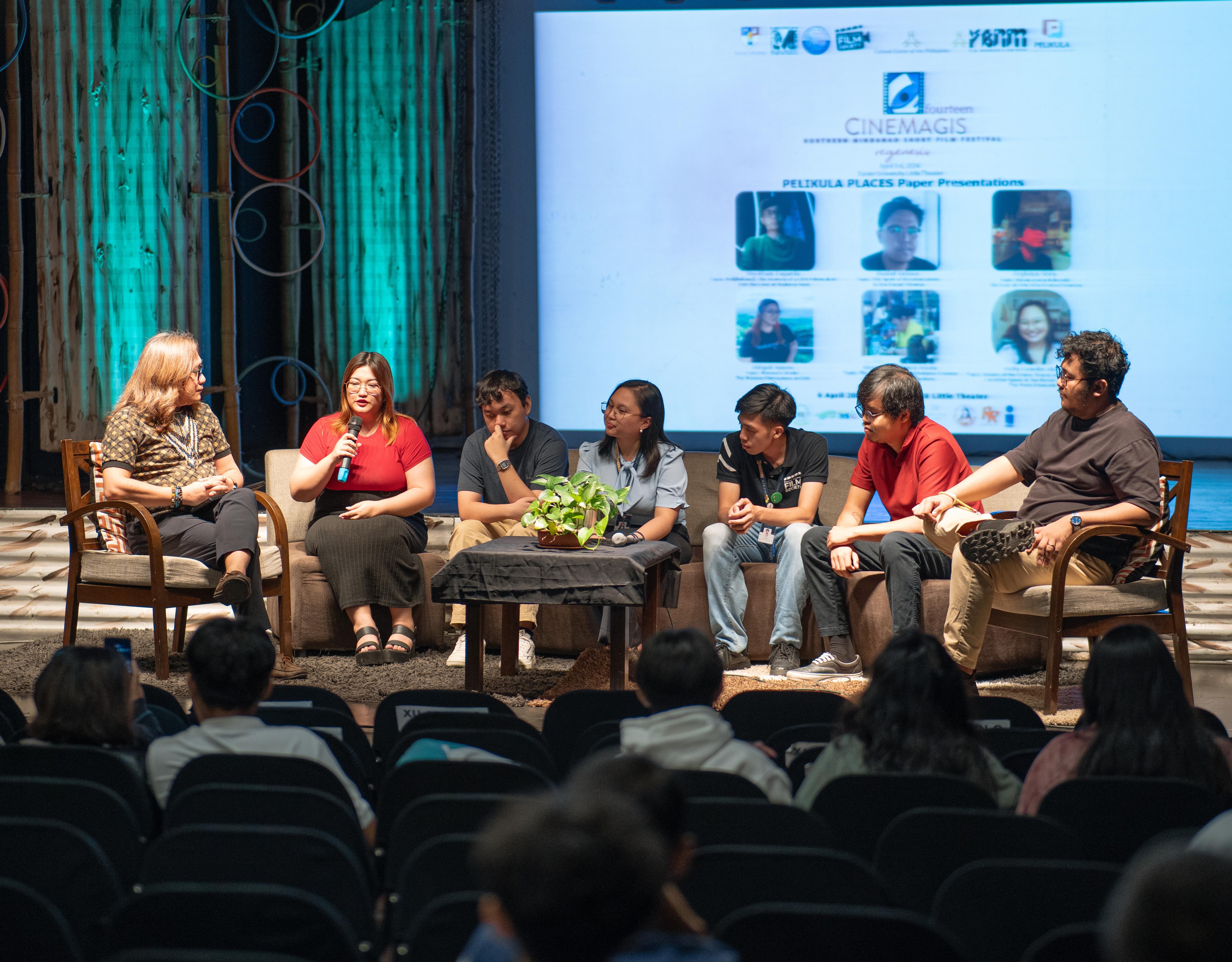

Genesis and regenesis
Prof. Hobart Savior PhD, the driving force behind the successful film festival, had already initiated film screenings through a program called Cine Arte before joining XU. These screenings featured classic, art, and world films, enriching the academic experience at his previous institutions.
In 2008, when he finally came to XU, an identical initiative called Cinemagis already existed under Fr. Noel Bava SJ. It was only in 2009 that it became a film festival in Northern Mindanao through Savior’s efforts and later blossomed into an annual celebration of creativity, storytelling, and visual artistry, transforming the region’s cultural landscape and beyond.
During Savior’s tenure at Liceo de Cagayan University from 2019 to 2022, the event continued and rebranded as Northern Mindanao Film Festival.
However, with Savior’s return to XU in the AY 2022–2023, the festival also made a comeback, albeit an academic
n partnership with the Cultural Center of the Philippines (CCP), the Xavier Center for Culture and the Arts (XCCA) held its 14th edition of Cinemagis Northern Mindanao Short Film Festival from April 3 to 6 at the XU Little Theatre. With the theme “Regenesis,” this year’s Cinemagis was attended by the University community and guests, showcasing the talents of local filmmakers and bringing their narratives to the forefront.
year later, reverting to its original branding.
Savior considers this year’s Cinemagis as a rebirth. He believes that it used to be one of the pivotal film festivals for local filmmakers in Mindanao, or even in the Philippines, and its hiatus may have contributed to lessening its influence. Now, the festival draws inspiration from its early days, aiming to foster a renaissance of sorts. “Kasi pag masyado na siyang matayog, it needed pruning, and I think this is the pruning, so that new spouts will come out, new filmmakers will come out,” Savior explains.
In this edition, the festival showcased 10 competition films and 10 showcase films from different corners of Mindanao, featuring a mix of new and familiar filmmakers. Women filmmakers dominated this time, adding a fresh and diverse perspective to the cinematic landscape. During the first three days of the event, full-length films such as Bagong Buwan, Lando at
Bugoy, and Respeto, supported by CCP Lakbay Cine and Cine Icons, were also screened. Additionally, on the second day, Prof. Carthelyn Adajar PhD led a discussion on Film Anatomy and Appreciation.
Voices of visionaries Sponsored by the University of the Philippines Film Institute’s (UPFI’s) Pelikula Journal, the festival’s final day presented the papers of Pelikula Places fellows. Meckhan Tagarda delved into the cinematic journey of Opheus Nery, offering insights into the unique storytelling techniques that distinguish the Cagayan de Oro (CDO) filmmaker. Similarly, Rodiel Veloso’s exploration of decolonization in Joe Bacus’ films, Orpheus Nery’s recount of the Cine de Oro Film Festival’s origins, and Abigail James’ focus on the pioneering efforts of women filmmakers in CDO collectively painted a picture of a film community that’s as vibrant and varied as the narratives it seeks to tell.
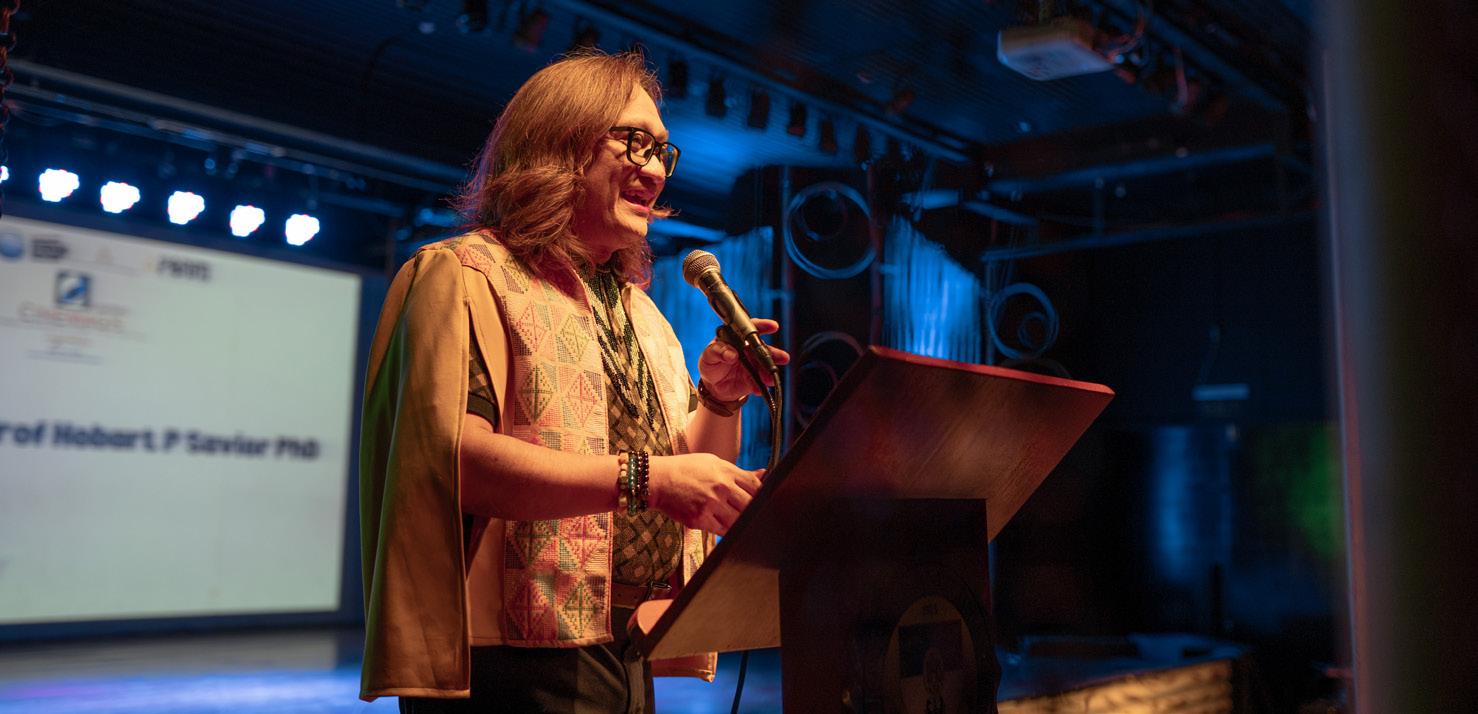
Alessandro Kennz Nioda and Kelly Camille Alair added further depth to the discussions with their respective takes on the representation of queer identities in Mindanao cinema and the imprints of CDO’s narrative space in Bacus’ Markado: The Moon Devourer
The final cut The festival culminated with the Awards Night, where Aan Light, a compelling narrative directed by Raj Valle that delves into the selflessness of an individual who illuminates the lives of others, rightfully earned the Special Award on Gender Advocacy. Best Actor and Best Actress awards went to Charlie Rey Maata for Lente and Wally Walter for Desilya, respectively, highlighting their exceptional performances in their roles.
Lente, a film that intriguingly zooms into the alter world, also clinched the Best Short Film and Best Director awards for Rosalie Escala-Sharif’s exemplary work. 1st
runner-up recognition for Best Short Film was awarded to Toni Cañete’s Desilya, which explores themes of family reconciliation, memory, and the universal search for belonging. Aan Light claimed the 2nd runner-up, while Innocents by Aldrin Cork received a Special Citation for Alternative Cinema, further underlining the festival’s celebration of innovative filmmaking.
***
Through a blend of new voices and seasoned storytellers, Cinemagis has once again illuminated the path for regional cinema, offering a platform for stories that resonate with authenticity and heart. In doing so, it has not just celebrated the rebirth of the festival but has also sown the seeds for future generations of filmmakers to thrive, ensuring that the spirit of Cinemagis continues to evolve and inspire.C
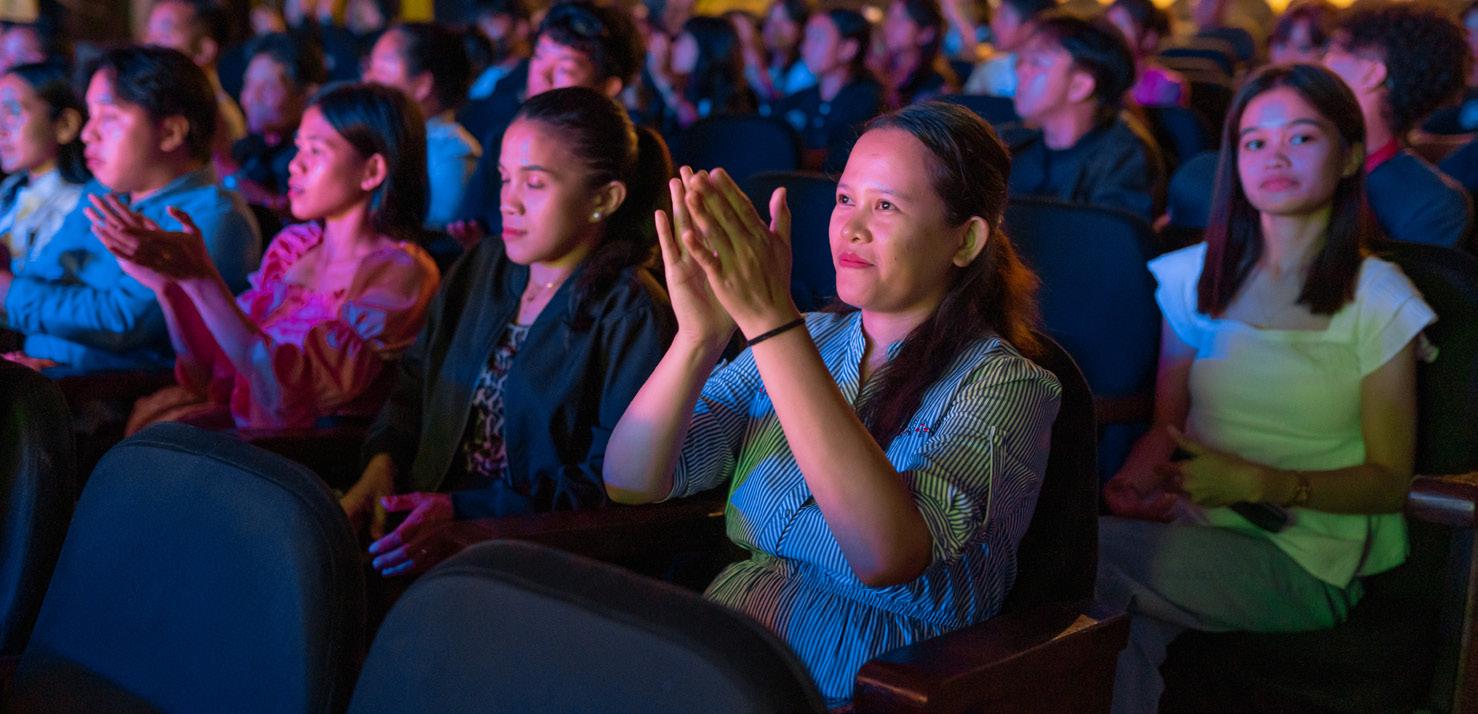
FROM PAGE 1
Revving their engines Before its climax, the AECO Week had already set the scene in motion with the theme: “Utilizing purpose and bridging minds.” Featuring activities by the XU AECO–Pet Society and the XU AECO–Atenean Tabletop Guild (ATTG), the momentum soon led up to the tudloAECO Orgmania.
Now a revamped version of the annual Org Fair, AECO SecretaryGeneral Sophia Talampas shared that this year’s edition took inspiration from science fairs, with the defining analogy cementing itself in how students can witness and learn from exhibits of various organizations. These exhibits not only open various doors of opportunity for students in recreation and holistic growth but also nurture the ever-growing and rich cultural landscape of XU studentry.
“I hope that with each passing year, it will have an even greater impact, inspiring and engaging more individuals,” Talampas says. “Witnessing the exchange of practices among different organizations is fulfilling, as it demonstrates the shared values and practices that unite us and enrich the broader academic community.”
However, with a wide scope of activities, more than the oneday culmination was needed for such a scale and objective. As the invitation was extended not only to the XU community but also to those from different universities and campuses, Talampas further asserted that prolonged promotional efforts could have aided in reaching a wider audience. That, alongside a bigger budget given the project’s potential, is what she hopes to improve for next year’s Orgmania.
“As this project is sustainable, we aim to ensure its longevity,” she shares. “After all, tudloAECO was created with the community in mind.”
Revitalizing Org Culture
Whether it’s workshops, seminars, displays, or a walkthrough of an organization’s operations, tudloAECO Orgmania has something in store for everyone. For tudloAECO 2024 Project Head John Suniel, it highlights the depth and diversity of available activities, emphasizing that the event also sought to “create a thrilling and inquisitive ambiance.” One look at the list of participating organizations
would answer just how diverse the project was: ranging from the Red Cross Youth; SIRAJ–MRO; Japan Karate Association; XU Peer Facilitators; Cultural Dance Troupe; and the Dulaang Atenista; to the XU–ADC Parliamentary Debate Circle; XCEED; Philippine Association of Agriculturist JRS; Google Developer Student Clubs; and the Xavier Ateneo Film Society.
Suniel also notes that this culture gives way to belongingness and development through identity. “Through [sic] celebration of diversity and giving rise, Orgmania, and other initiations encourage the production of whole personalities with both academic performance and sociocultural involvement,” he expresses. “It fosters collaboration, leadership, and personal growth [...] where students are capable of making something valuable.”
The exchange of values and practices that make each organization thrive and withstand time stands to be the essence behind org culture, as well as engaging students to hone the part of themselves that is otherwise unattended to in the pursuit of academic excellence, upholding the vivid, extra-curricular scene that Xavier Ateneo is known for.
Talampas asserts how tudloAECO Orgmania brings the student community together and the multifaceted organizations of the University, all with their visions. “While each organization has its distinct culture, tudloAECO brings them together under the umbrella of AECO,” she says.
***
The second half of the academic year has only begun for AECO, with another event already on the horizon as Orgmania winds down, furthering the possibilities and bolstering org culture within the university: the AECOLADE, which Talampas reveals is a celebration of exceptional efforts throughout the school year, and is slated to be held in June.
With that in sight, tudloAECO Orgmania is a rousing testament to how student holism continues to stand tall, painting whatever mundanity there is into endless vibrant possibilities— nurturing, connecting, and even educating the community—all by the students’ hands, come what may.C
FROM PAGE 1
With these two parties vying for the mantle of student representation, USAD’s continued absence is a worrying sign. For years now, they have been a no-show in the two highest CSG seats, slowly losing their place at the table, much like how most of the political parties vanished in the past— stagnant, felt, but never seen.
Championing policy-making
With the Golez-Eguia administration followed by the GuanzonMercado tandem, and now CotacteSudaria at the helm, DASIG’s momentum seems to be carrying them forward.
The establishment of DASIG in 2021 exposed a vulnerability in the Philippines’ second-longest-running student socio-political organization, AA. Championing the power of policymaking, DASIG set a new trend in the field, garnering significant support and trust, which led to a dramatic shift in the yearly campus elections.
The end of AA’s dominance highlights the undeniable impact of DASIG since its formation. Their consistent focus on student-centric leadership and the GREEN Agenda has been instrumental in securing consecutive CSG victories for the past two academic years. And as DASIG expands to the senior high school level, other parties should learn from their
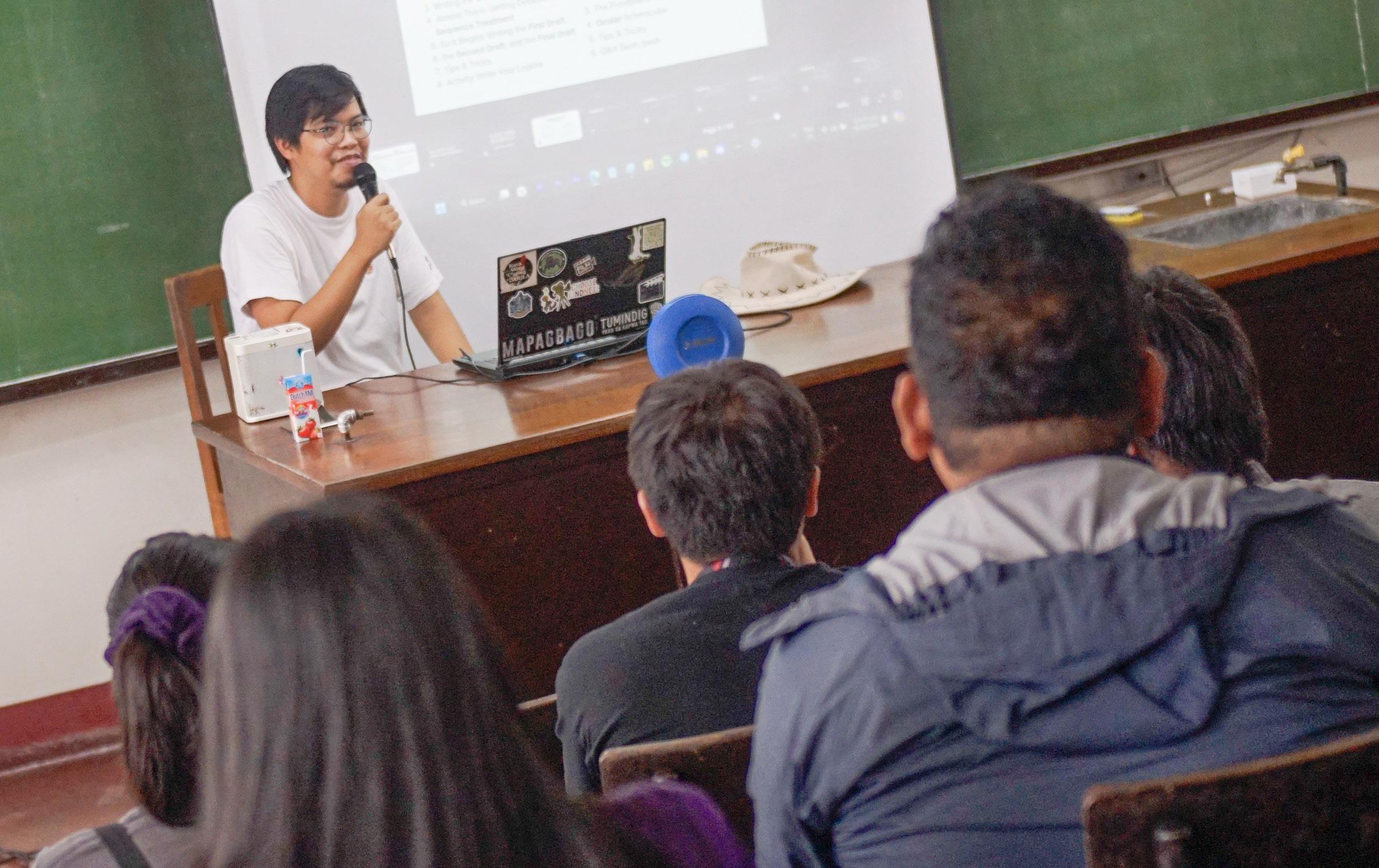
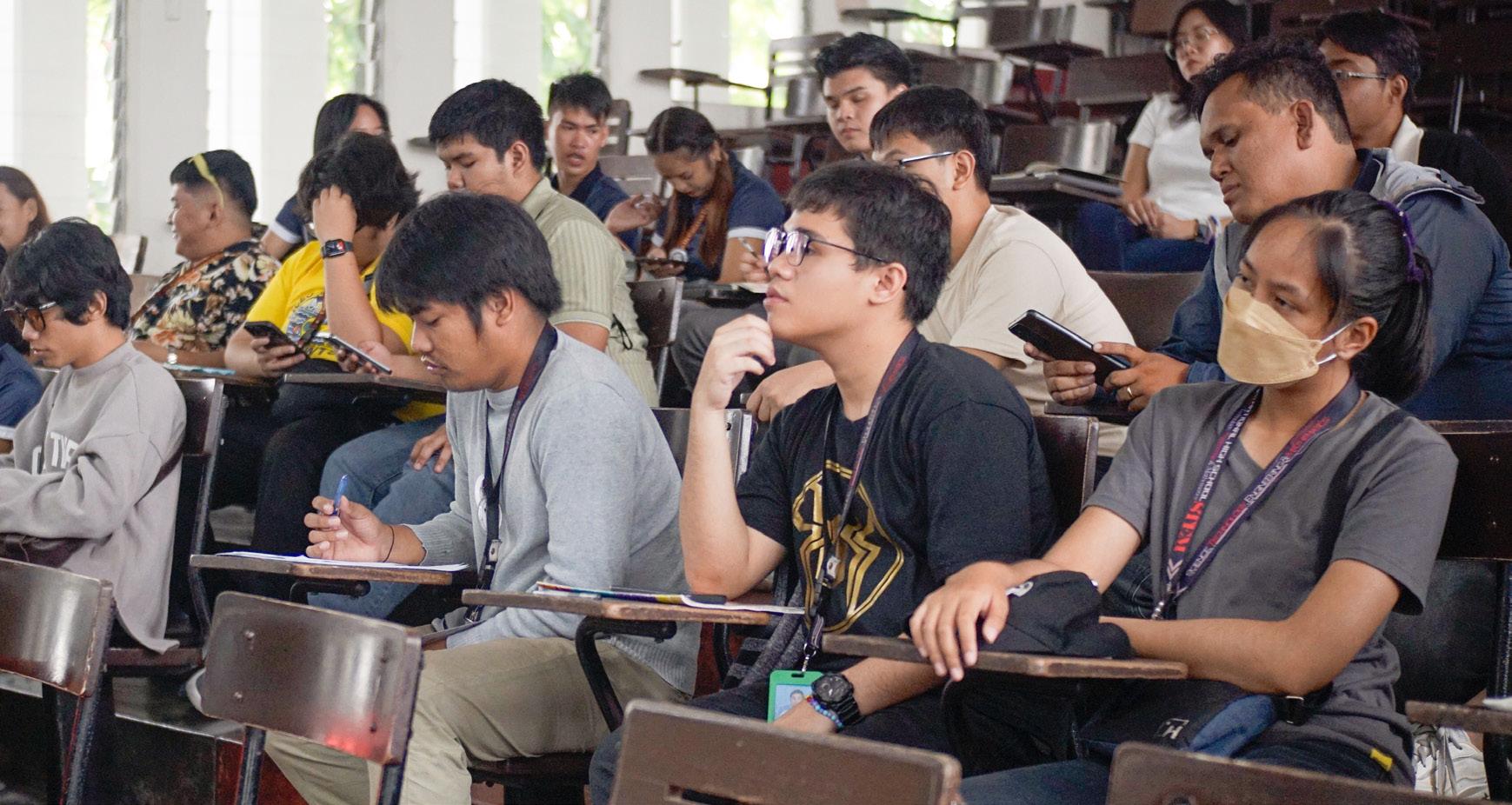
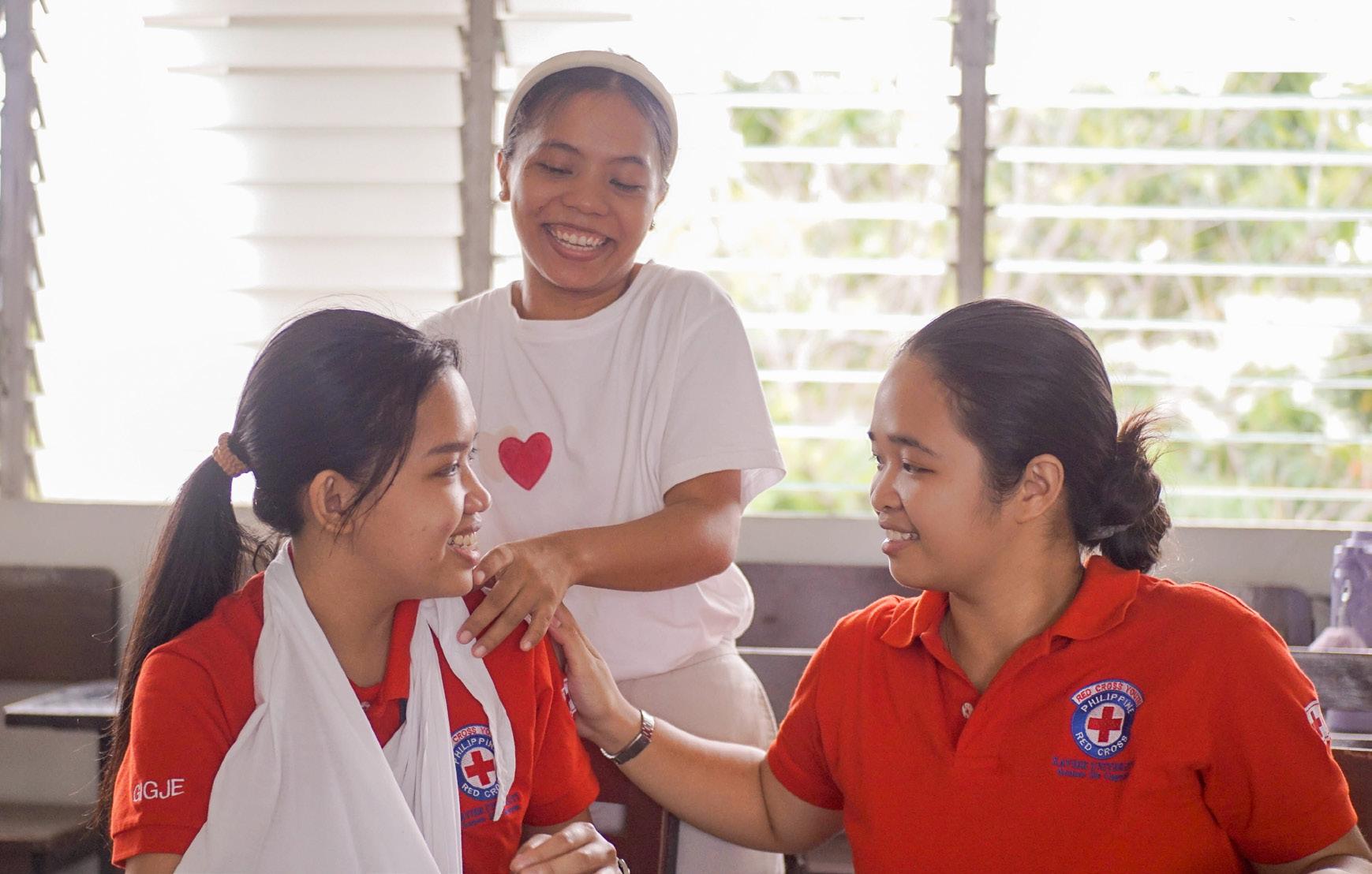
success. Understanding their priorities and consistently aligning their actions with the party’s agenda to address the true needs of the Xavier Ateneo community are key takeaways. Although branded as the candidates-to-beat, they are not exempt from scrutiny. It’s not just their “Magis through Legis” platform that needs revisiting, but also the growing pressure on the Cotacte-Sudaria tandem. The pressure trickled down to the college council level too, with the party marking a huge gap with a near “clean sweep” win in four out of seven college council presidential seats. Dominating the CSG and the councils, the standards DASIG set today may become the bare minimum for students, who will demand more.
With the current administration having addressed numerous student needs, the challenge lies in the moderation of the quality and sustainability of their promises as radical pragmatists pushing boundaries further than ever—given the recent telling tale of a surge of resignations in the CSG mid-semester. After all, strong policies can only be expressed to the fullest by the strength of its enforcing institutions and its members. Weakened ones caused by burnt-out leaders render insufficient service, if else none, to the student body at all.
Losing familiarity
AA’s firm hold on college council seats up to the CSG level is no surprise for a party that’s been around for nearly four decades. However, their recent struggles suggest unfamiliarity with the evolving political landscape. Their past success in uncontested elections left them ill-equipped to formulate winning strategies for the current climate, placing them behind DASIG in this political race.
Despite their long history of serving students, AA seems to have lost touch with their needs and representation.
In just three years, they’ve gone from reignant to underdog, struggling to navigate the very political arena they once shaped.
DASIG’s commanding lead in today’s elections is a clear sign that AA appears to be no match., This should be a wake-up call for the alliance. They must adapt to current trends and meet the standards set by DASIG with better strategies to regain the students’ trust and preserve their 37-year legacy.
Lack of political will
With USAD advocating for social democracy while not disregarding the more proximate issues inside the university; they can give DASIG and AA a neck-and-neck battle only if they elect torch-bearers that will lay the party’s core value at the CSG stage.
Effective promotions, a strong team of experienced leaders, and a compelling platform built on the four pillars of freedom, equality, solidarity, and social justice position USAD to lead the student body towards transformative change.
One key area for improvement for USAD is developing a stronger sense of political will within their organization. They must instill in their members the understanding that effective leadership goes hand-in-hand with a genuine political interest in serving the student body.
In an interview with party premier John Erico Pimentel (ABIS 3), he highlights that USAD is introducing its “bottom-up” approach to leadership which intends to concentrate on the cocurricular organizations, believing that these organizations better understand the plight, concerns, and issues that every student faces and to empower those who are at the grassroots level.
“It’s not more on the reason nga wala mi ma find nga potential or fit nga candidates for CSG,” Pimentel explains to clarify why they snubbed the CSG slate this year. Conversely, USAD currently holds only three out of the seven college council seats, and none are full slates. This limited representation suggests their “bottom-up” leadership approach might just be a scapegoat to conceal the real score happening inside
their organization. While they boast competent leaders who can effectively communicate their core values, the lack of political will is hindering their push for central leadership in the campus political scene.
This year, Botar Atenista’s voter turnout was at a mere 55.61%, with 3,566 students of the undergraduate student population participating in the elections. Of this number, 473 (13.26%) chose to abstain in the presidential race, 463 (12.98%) in the vice-presidential bet.
DASIG’s dominance, then, comes with a great responsibility. More than preparing to tackle the challenge of long-term sustainability, it must gear its platforms and policies to cater to the greater student body—especially those seemingly apathetic to their cause. Meanwhile, for AA, this election serves as a wake-up call, an opportunity to revamp their strategy, refocus their efforts, and truly embody the alliance’s core values. USAD, too, can leverage this moment to step up and present its vision on the CSG stage.
A critical turning point, Botar Atenista 2024 ends not only with a new set of leaders for the student body, but with an array of challenges for the offices, parties, and representatives that continue to shape XU’s political landscape.C

break you.
“Be careful, you might drop that,” her sister’s voice rang. Elise looked up and saw the bride-to-be casting her a stern, but concerned, look. She motioned to the glass vase in Elise’s hand that the latter had been toying with absentmindedly. Elise made a face before placing the item back on its shelf.
They were at Atticus, shopping for centerpieces for the wedding reception. Well, Erin and her fiance were. Elise was forced to be here since her sister thinks that she is incapable of being alone anymore. Erin made it her personal mission to drag her to every showing, cake and wine tasting, and whatever wedding-related thing was necessary. Elise had a sneaking suspicion it was more about wanting a maid of honor running her errands, rather than that of genuine sibling concern.
Elise continued to browse for vases, making sure to stay out of her sister’s way. She also made sure not to get lost in thought this time, just so Erin wouldn’t worry about her.
All everybody did nowadays was worry about her.
Read the full online version of this issue at bit.ly/AprilBroadsheet24 or at issuu.com/thecrusaderpub
Story by Reina Margaret Gwynette T. Villamor
Layout by Kevin Matthew N. Pacana
“You say you’re fine ten times a day,” Erin would say. But she was. Did she end a three-year relationship and potentially lose the love of her life? Yes.
But she was fine. She had to be, since she was the one who broke him.
In the same way one does not mean to break glassware, Elise did not mean to break Dexter’s heart.
They were enjoying a nice meal at a nice restaurant. Dex was talking about his new clients at work, he had just been promoted to senior manager at their firm. Elise was listening, and yet, she could not help but feel that the restaurant was too nice—too romantic and intimate. It was a fancy Italian bistro, the kind that one sees in romcoms. Dex enjoyed the romance of it all, and while it was sweet, Elise just never got used to it. But still, it was a nice meal at a nice restaurant, and Dex and Elise were having a good time.
Until they served the champagne. Two problems with this: a) Elise does not drink champagne, and b) Elise wouldn’t drink champagne with a diamond ring floating around inside of it. She snapped her head up at a smiling Dex, heart pounding and ears ringing.
“Is everything okay, Eli?” he asked, taking her hand. She pulled it away and set the champagne glass down. Elise
said no about fifteen times, refusing to even let him talk.
“You cannot do this to me,” she almost begged.
Sometimes, Elise thought that love was the only thing they had in common, and she often wondered whether that would be enough. But Dex usually changed her mind, turning the unlikeable into something bearable.
But she should have let him talk. Maybe then he would have been able to tell her that the ring wasn’t his, and it certainly wasn’t meant for her.
A waiter tapped on her shoulder, worry and embarrassment painted all over his face. He gestured towards the champagne glass; apparently, it was served at their table by accident. The waiter apologized for the interruption and, ten minutes later, a couple got engaged near the restaurant’s bar. Meanwhile, Dexter and Elise spent the very same ten minutes in awkward, painful silence.


Erin and her fiance settled on pink peonies and an array of baby’s breath for the centerpieces. They let Elise pick a small, clear, square vase that could house the mini flower arrangement. “Your guests will love it,” Elise remarked proudly. But instead of a smile, the couple shared a look before Erin cleared her throat.
She refused to look at him. Instead, she stared at her half-eaten lasagna and kicked herself mentally for agreeing to have dinner in a fancy restaurant. Elise hated fancy restaurants, but like various parts of their relationship, she let Dexter have his way. They’ve always been like this—different in almost every aspect. They disagreed on food, movies, and even the future. Sometimes, Elise thought that love was the only thing they had in common, and she often wondered whether that would be enough. But Dex usually changed her mind, turning the unlikeable into something bearable. But there were always non-negotiables.
“You know how I feel about marriage,” she said, breaking the silence. “Yeah, now more than ever,” was all he replied. They broke up that same night.
It took exactly six months and planning her sister’s wedding for Elise to be fine. She was here, at a quaint little flower shop, a bit lost in thought
“Speaking of guests,” she began gingerly. Elise interrupted her, saying she was okay if Dex still came to the wedding. She had expected this and was, by default, fine with it.
“Eli, he’s engaged.”
It took exactly six months and planning her sister’s wedding for Elise to be fine. And apparently, it took exactly six months and finding a fiance for Dexter to do the same. Not knowing how to react, Elise could only stare at the vase she selected.
There are two kinds of people in this world, she thought: those you’re afraid will break you, and those you want to break.




It was a sweltering March afternoon when I was called to the dining hall for merienda. I heaved a sigh of relief, I was losing my mind during this long weekend. Aside from being trapped back home with nothing fun to do, there was the issue of the scorching summer heat. I went down quickly, expecting iced tea, iskrambol, halo-halo, or anything to cool myself. To my disappointment, it was the last one—its hot version.
I think it’s time to break my silence. I, Cora Contrabida, TheCruchever Editor in Chief and longest-standing student in the University, hate binignit. Now before you revoke my Filipino card and call me maarte, allow me to explain. Yes, it’s a sweet and creamy delicacy enjoyed by many, but it is not that good for people to treat it as the “lechon” of Lenten meal preparations. Binignit this, binignit that... it’s basically warm
‘‘No amount of mass, prayer services, and penitensyas will save you… mere prayer is lip service if it doesn’t translate to action.
halo-halo, be so serious right now! Bottomline is, binignit is overrated and I have never understood the hype. And like my aversion to binignit the same can also be said about Holy Week. The Filipino means of faith as a whole, really. But before we get into that, let me finish the merienda oh so forced upon me.
A sweet delicacy
Now that I think of it, binignit and Filipinos are so alike, one is a pretentious dish while the other is just pretentious. Any binignit connoisseur (couldn’t be me) would know that the two of its main ingredients are coconut milk and tons of purple food coloring to make it look pleasing. To me, that’s a reflection of the Filipino character exemplified during the Holy Week. Let me tell you my observation. Recently I’ve seen lots of Facebook posts of people sharing their Holy Week
practices. Don’t get me wrong, it’s wonderful to see traditions continue, but come on! That Good Friday spiritual discipline is always short-lived come Saturday. There is an almost poetic mirror seeing people participating in Visita Iglesias and walking in religious processions while their mouths run gossip.
And it’s not limited to calling our neighbors’ binignit luspad and lasyaw. How often do we see our pious, religious relatives and friends feed on gossip about someone’s appearance, status, and the like? Hell, some even do it at the very religious functions that promote prayer and kindness! It’s no wonder that everyone anticipates Easter Sunday. More than the return of Christ comes a return of old habits. People can forego the niceties and revert to how they usually are—as if they even tried to change.
Enjoyed by many A crowd favorite, binignit is a must in every Holy Week table.
As an established hater, I certainly cannot pass up the opportunity to become a food critic the moment the neighborhood shares its version. We already know the main components of the dish, now if you ask me what the main ingredients of a Filipino are, it would be a sprinkle of faith and one whole cup of clout.
Here’s a fact: I grew up religious. Just like how I can hate binignit because I’ve tasted it, I have also experienced the same religious practices. My family and I go to church on Sundays (yes, not just during Holy Week). Like the comfort this infamous delicacy brings, faith functions the same way. Hearing mass, reading the Bible, attending processions and gatherings, these are all consistent and routinary. People get lost in the solace of it all, embraced by the ideals of a loving and accepting Church.
I remember when my sister was about to take her board exam, my mother was more prepared to take it than her. Suddenly school supplies to be used in the exam were blessed, candles were lit, and more visits to the church occurred; as if God took bribes! But to be fair, they were just asking for guidance, not psychic powers. I cannot say the same for the rest though, especially those who use faith as the one-all-end-all solution to dismiss their problems. Depressed? Oh, that’s because you don’t pray. Confused by your sexuality? You’re confused, ignore it and pray. Discerning the right politician? Yes, you guessed it! Follow your elders and just pray.
Perhaps that is the comfort though. After all, to be faithful, kind, and active in the Church surely can even out the blatant corruption and injustice running rampant in our society. Maybe we can just keep praying. Who knows, one day God may just grant us that ever-elusive Php 20 per kilo of rice.
Not for all
The point is this: Like binignit maybe faith is not for all. Yes, the majority enjoys eating their hot binignit while the temperature is scorching, so we let them. But the same people shouldn’t shove the dish on others’ throats because, again, it is truly not all that!
Similarly, just as I detest the overzealous stream of praise for the dish on social media, I also raise an eyebrow at those who use their faith as a branding rather than a genuine way of life. It’s time to be a lot more truthful to ourselves and a little less pretentious to everybody else. If people can fight fire with fire for a bowl of binignit, they can also do the same for their faith. If you’re going to be kind make sure it’s not limited to the walls of a sacred place. If you’re gonna practice discipline, try doing it regularly and not just during Lent.
The bottom line: faith can only go so far. If one prays but continues to subscribe to the crooked actions of misogyny, homophobia, corruption, and other harmful behaviors, then one might as well stay at home during the Lenten celebration. No amount of mass, prayer services, and penitensyas will save you. I’m no angel, but I can affirm that mere prayer is lip service if it doesn’t translate to action.
But then again, what do I know? I am just a binignit hater.C



